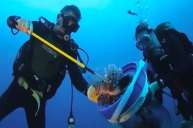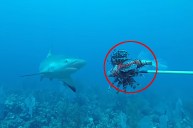Florida has come up with an ingenious way of getting rid of an invasive fish — serving them up to hungry customers. Food trucks in the region have begun serving lionfish as part of the menu.
At a quick glance, lionfish don't look particularly appetizing. They're brightly colored with various spikes. A primal urge in my brain is telling me that they're venomous — stay away. That may be true, but the venomous spines don't actually affect the meat of the fish. That means the invasive fish is edible. As far as taste, diners say the flavor resembles hogfish. It's whit and sort of flaky.
For a time in 2016, you could even find lionfish in Whole Foods stores. Today, food trucks are serving lionfish alongside wild boar and iguana tacos. Think of them as an invasive species food truck, according to Tampa Bay Times.
For Floridians, the invasive species is a common nuisance. The state has declared war against the fish with fishing tournaments and all-around fishing, trying to eliminate them. There's a saying — see a lionfish, kill a lionfish. The state offers incentives to fishermen to turn their kills in.
Florida Tries To Kill Invasive Fish
According to local legend, a hurricane in 1985 caused a wealthy man's aquarium to burst open, introducing 100 lionfish into the wild. This is likely false. However, the fish's introduction was traced to 1985. Owners likely dumped the fish into local waterways when they grew too big for their tanks. Now, their populations have exploded in the Gulf of Mexico.
The invasive species has no natural predators. They can tolerate various temperatures, and they are ravenous eaters. In a study conducted seven years ago, researchers discovered that lionfish consumed at least 167 species: 128 fish, 15 shrimp, 17 crab and three lobster. Additionally, they also reproduce rapidly with a female laying over 2 million eggs in a year.
Thus, Florida has launched the Lionfish Challenge. For almost a decade, the state encourages fisherman to kill lionfish for prizes. Last year, they killed more than 26,000 of the invasive species. This year, they've killed more than 11,000. So far this year, 185 participants have harvested 11,501 lionfish. The last day to participate is Sept. 2.




